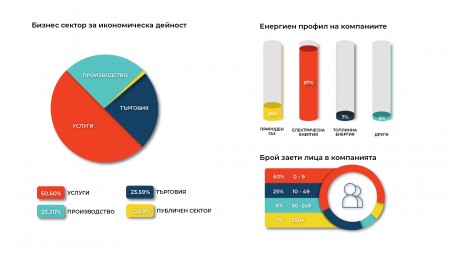Many companies in Bulgaria have adapted their plans to meet the challenges posed by rising energy prices. Nearly half of the companies in Bulgaria expect the electricity price to rise yet again in the second half of 2023. They have postponed or redirected their future investments towards cost optimization measures with immediate effect or to increase the prices of goods and services, according to a survey on the effects of thе programme compensating all non-household end users for high electricity prices between October 1, 2021 and March 31, 2023. The study was organized by the Energy Ministry and Elca.bg - independent electricity offer comparison platform, the Ministry said on Monday.
The survey was conducted among 500 nationally represented companies, some 93% of which are small and medium-sized enterprises with less than 250 employees. Half of the surveyed companies operate in the service sector, 25% - in manufacturing, 23% - in trade, and the companies that are part of the public sector are less than 1%.
Data shows that more than 97% (486 of the companies surveyed) mainly use electricity to operate. Only 14 companies use natural gas in combination with heat or other energy resources. Nearly 78% (389 companies) are wholly dependent on electricity, including 85% of companies surveyed in the trade sector, 79% of companies in the service sector and 68% of those in manufacturing. Over 46% have a monthly consumption of less than 1,000 kWh, which corresponds to the structure of the electricity market.
Nearly 30% of the respondents do not know whether they buy their electricity from an electricity trader or directly from its producer. These are mostly companies with consumption below 1 000 kWh per month. Some 20% are not aware of either their monthly consumption or their tariff plan.
According to the study, measures to help companies cope with high electricity prices have reduced the negative impact on the business industry.
It can be concluded that in exceptional market circumstances and crisis situations companies need state support in the short term. These measures should complement, not replace, long-term development and growth policies for economic actors, the press release also said.
